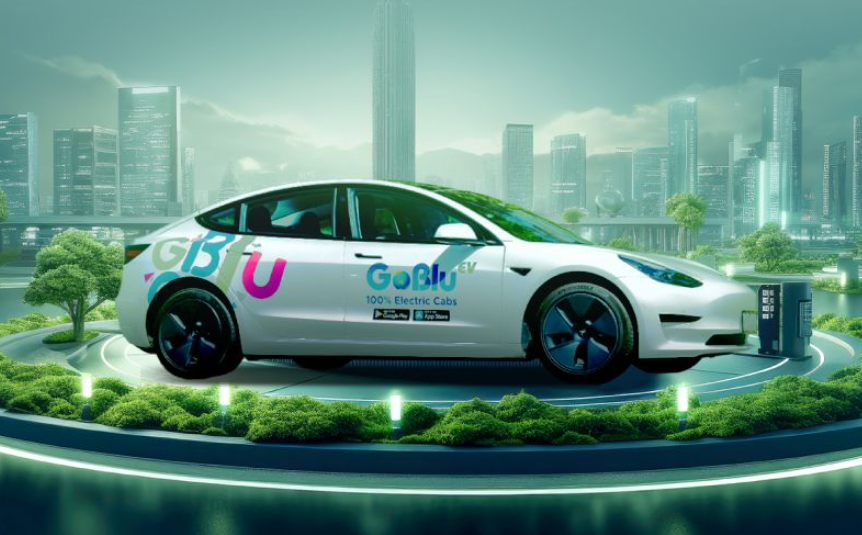The ride-share industry has seen significant transformations in recent years, but not all changes have been for the better. While companies like Uber have introduced innovative ways to travel, concerns about their environmental claims and treatment of drivers have persisted. Enter GoBlu, a Melbourne-based startup aiming to address these issues with its all-electric taxi service.
When you order an Uber Green, you expect an eco-friendly ride. However, recent data from the European Union reveals that hybrids—cars with both petrol or diesel engines and electric motors—emit nearly four times more pollution than manufacturers claim. This discrepancy raises questions about Uber’s strategy of marketing hybrid fares as “green” solutions.
GoBlu, founded in July 2023 by Manish Wadhera, seeks to offer a genuinely green alternative. “The concept of GoBlu emerged from the need to address common issues faced by thousands of Australians who rely on cabs or taxis daily,” says Wadhera. Frequent complaints about unhygienic vehicles, rude drivers, surge pricing, and random cancellations are prevalent in the industry. GoBlu aims to resolve these concerns with its all-electric fleet and a commitment to excellent service.
A promising start
In less than a year, GoBlu has made significant strides. The company claims to have completed over 3,000 zero-emission rides, using a fleet that includes Tesla Model 3s and BYD Atto 3s. Unlike Uber, GoBlu owns or leases all its vehicles, ensuring they meet strict environmental standards. Wadhera notes, “One-third of our users have booked more than once, with growth driven primarily by organic referrals and performance marketing.”
The company’s early success has led to frequent inquiries about expanding to other Australian cities like Sydney, Adelaide, and Brisbane. While GoBlu currently operates only in Melbourne, there are plans to broaden its reach across the country.
Driver security and service quality
One of the significant issues in the ride-share industry is the financial insecurity faced by drivers. Companies like Uber and Lyft often squeeze driver earnings, making the work unreliable and stressful. GoBlu addresses this by paying its drivers a fixed weekly salary, providing them with better job security. This approach not only benefits the drivers but also enhances the overall service quality for passengers.
Wadhera explains, “Our drivers don’t have to cancel the ride if they get a bigger ride. Because that’s not their worry, that’s totally on us as an organisation. So that’s where the zero cancellation policy comes in.”
By eliminating the pressure to chase higher fares, GoBlu allows drivers to focus on delivering a reliable and pleasant experience for passengers. “Drivers don’t have to worry about the number of rides they have to do in a particular shift,” Wadhera adds.
A new model for ride-sharing
The traditional ride-share model has been criticised for its exploitative practices. In his book “Technofeudalism,” Yanis Varoufakis likens companies like Uber and Lyft to feudal lords, extracting rents from drivers and passengers. Varoufakis envisions an alternative cooperative model, where driver-owners and public transport staff control the algorithms, not corporate giants.
Varoufakis writes, “Your coffee mug empty, it is time to go to work. You tap on your phone’s travel app, also provided by your municipality, and then tap again on ‘work’. A list appears of fares offered by various driver cooperatives, alongside information on where and when you can catch the nearest bus or train.”
The future of ride-sharing
As awareness of environmental issues and driver exploitation grows, the ride-share industry is poised for change. GoBlu’s model of owning its electric fleet and paying drivers a stable salary could be a game-changer. This approach ensures genuine green transportation and provides financial security for drivers.
Uber, which takes a 27.5% cut of all fares in Australia, represents the old model of exploitation. This substantial cut affects drivers’ earnings and lacks the security of a full-time salary. As more consumers and drivers become aware of companies like GoBlu, the demand for ethical and sustainable ride-sharing options is likely to increase.
GoBlu is making waves in Melbourne’s transportation scene by addressing common ride-share issues with its all-electric fleet and fair driver compensation. As the company expands, it could set a new standard for what consumers expect from green transportation services. With growing concerns about environmental impact and driver welfare, GoBlu’s model offers a promising solution for the future of ride-sharing.



